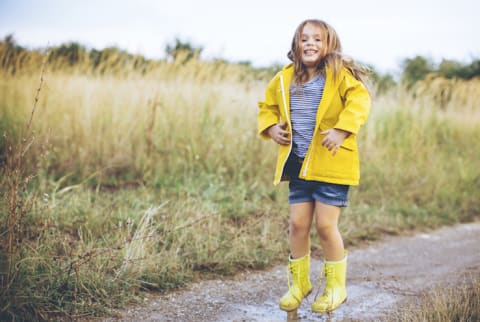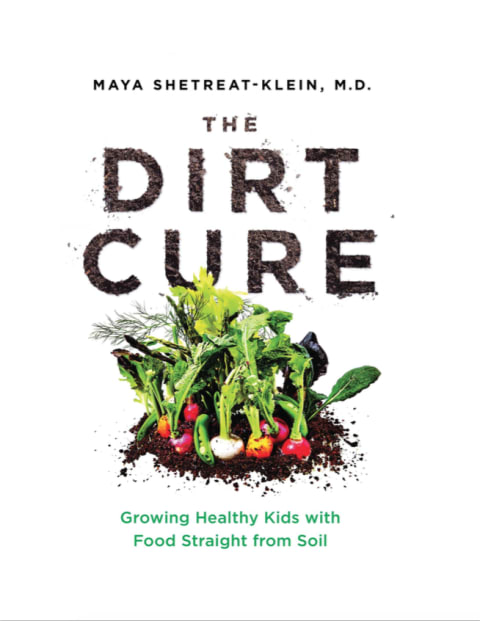Advertisement

Most non-farmers — which is to say, almost all of us — think of soil as being utterly irrelevant. But we couldn’t be more wrong.
Soil plays a profound role in our children’s health and happiness. Indeed, the health of our inner terrain, the internal environment of bodies, reflects the health of our outer terrain, or the world around us.
As an integrative pediatrician, I successfully employ what I call “Terrain Medicine” in my practice every day as a way to help children recover from intractable neurological and other chronic issues. In my new book, The Dirt Cure: Growing Healthy Kids with Food Straight from Soil, I explain how good old dirt helps keep your children happy, healthy, and smart:
1. It provides nutrition.
This may seem obvious, but it's important to remember that good soil quality means more nutrients in food. We are what we eat. We eat plants (and animals who eat plants), and plants are nourished by sun, water, air, and soil.
Studies have shown that vegetables grown organically are higher in phytonutrients, the stuff of superfoods. These phytonutrients — which make cranberries red, lemons fragrant, and leafy greens bitter — also make food both delicious and healthy for our kids.
For instance, receptors that bind bitter compounds found in dark chocolate, leafy greens, or even coffee line not just our mouths but our entire digestive and respiratory tracts, including the nose, throat, and lungs. They then improve gut motility (which reduces heartburn, bloating, gas, and constipation), regulate blood sugar levels (which regulates appetite), and help us to fight infections (staving off coughs, colds, strep throat, and flu).
A soil microbe has been shown to boost serotonin levels and increase learning ability.
2. It's linked to fewer allergies.
One teaspoon of healthy soil holds as many living organisms as there are people on Earth. Soil has its own microbiome, and it shares that microbiome with us.
Most people have heard of the hygiene hypothesis. Rural children, who spend more time getting dirty, were found to develop fewer allergies and asthma than urban children, who were thought to be too “clean.” Yet the real story turns out to be more complex.
When researchers measured microbes on a farm and in an urban apartment, their numbers were similar. What distinguished the farm, however, was the heterogeneity of its microbes. Ultimately, this tremendous microbial diversity powerfully strengthens children’s digestive, immune, and nervous systems, with a side benefit of discouraging any one organism from replicating out of control.
3. It can improve memory and focus.
Children who spend time on highly natural playgrounds — rather than blacktop or turf — tend to perform better in school than those who don’t.
In a study of more than 2,600 children, researchers found that children in schools surrounded with more greenery had significantly better working memory than those who didn’t, even when they corrected for socioeconomic status.
4. It has mood-boosting effects.
Soil reaches into children’s bodies and brains when they get dirty in nature. If you feel wonderful when you’re gardening or hiking, it may be in part because Mycobacterium vaccae, a soil microbe that enters your body through your nasal tract or small cuts in your skin, boosts serotonin to levels similar to those you get from antidepressant medications.
M. vaccae make us happier and also smarter for up to three weeks following each exposure. So help your children plant a garden or make some mudpies!
5. It can reduce inflammation.
Being in contact with soil helps to neutralize free radicals in our bodies. Grounding, or earthing — literally being in physical contact with the earth — has been shown to reduce inflammation and pain, improve wound healing, and boost mood. Let your children walk outside barefoot or sit on the ground for at least 10 minutes a day!
6. It helps with stress management and sleep.
Forest bathing — periodically immersing ourselves in the environment of the woods — has been studied extensively as a form of preventive medicine in Japan.

Beyond the simple enjoyment and learning that can occur in the forest, children can derive diverse benefits including reduced stress hormones, boosted executive function and focus, better sleep, and increased production of anti-cancer proteins. Explore the woods with your kids and reap the benefits!
Related read:
